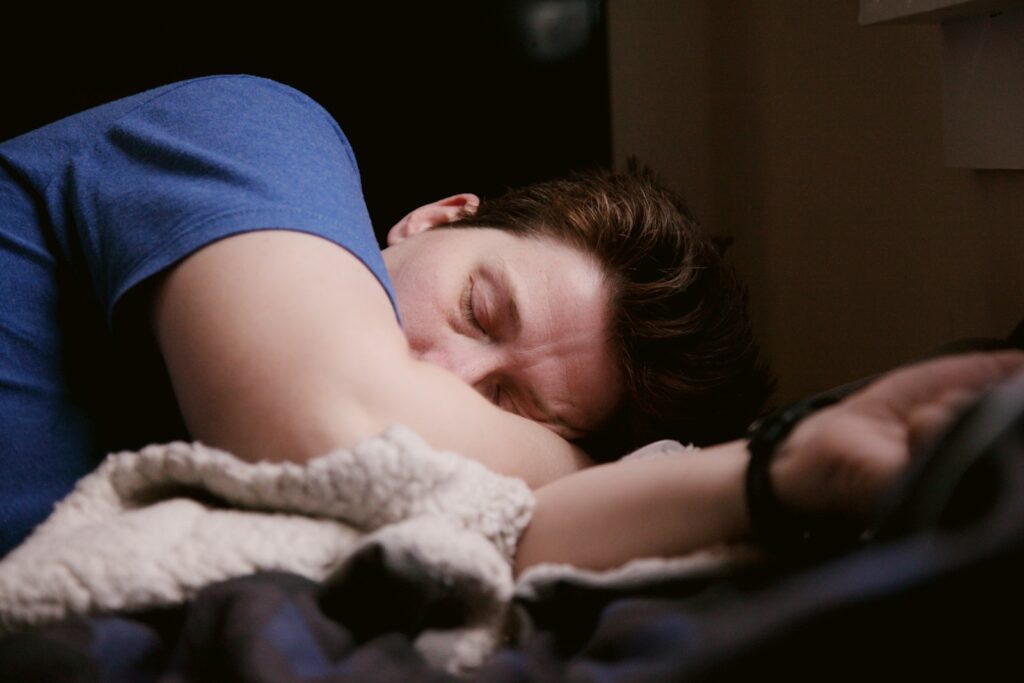
Some people hide their pain so well that nobody notices. They show up on time and keep smiling even when everything inside feels shattered. The truth is that broken doesn’t always look broken. It wears a mask and goes through the motions. Recognizing these signs takes attention because the people who need help most are often the ones who seem fine on the surface.
They laugh a little too hard at nothing.

There’s something off about the way they laugh at jokes that aren’t funny. It comes out forced, filling the room with a sound that doesn’t match what’s happening. Sometimes it happens during quiet moments when nothing is said at all. The laughter feels like it’s covering something instead of expressing joy. Their face might smile, but the rest of them stay still. It’s the kind of laugh that ends abruptly and leaves an awkward silence behind.
Their coffee sits untouched most mornings.

The cup goes cold on the counter while they stare at their phone or out a window. They used to finish it before leaving the house. Now it just sits there getting a film on top while time passes. Maybe they forget about it, or maybe drinking it feels like too much effort. Either way, the routine has broken down into something they can’t seem to complete. Small rituals like that fall apart when someone’s holding too much inside.
Plans get canceled with vague excuses.

They were supposed to meet up, but sent a text an hour before saying something had come up. The excuse changes every time and never sounds quite real. Maybe they’re tired, have errands, or just forgot. What stays consistent is that they’re not showing up. People who are breaking down inside start pulling back from the world. They need space but can’t always say why.
Conversations stay surface level now.

Ask them how they’re doing, and the answer is always fine. Nothing deeper comes out, even when there’s space to talk. They used to share stories about their day or complain about small frustrations. Now everything gets filtered down to fine, good, or tired. The person who used to open up has completely closed off. Something shifted, and they stopped letting people in.
They fill every minute with distraction.

The kitchen counter gets wiped down three times in an hour. Nothing was spilled there. Their hands just need something to do. Apps open and close without any real scrolling. Sometimes they rearrange things on a shelf that looked fine before. Sitting down doesn’t last more than a few minutes. The activity doesn’t have much purpose. It just fills time and keeps their mind occupied.
Their appearance doesn’t matter to them anymore.

Clothes that used to fit well now hang loose or wrinkly. Hair goes uncombed, and shoes stay scuffed. The person who once cared about how they looked has stopped checking mirrors. It’s not laziness or a style choice. When someone’s breaking, they stop seeing themselves as worth the effort. Getting dressed becomes about function instead of presentation. The outside reflects what’s happening inside.
Everything is fine with them.

Ask if they want pizza or pasta, and they say either is fine. Bring up weekend plans, and they’ll go along with anything. Preferences seem to have disappeared entirely. They used to have opinions about movies, restaurants, and music. Now it all blends into one long shrug. When someone stops caring about choices, they’ve probably stopped caring about a lot of other things, too.
Future plans don’t exist in their conversations.

They talk about yesterday or this morning, but never next month or next year. The timeline ends somewhere around tomorrow. Making plans requires hope that things will be different or better later. Without that hope, everything stays locked in the present. They might nod along when others talk about upcoming trips or goals, but they don’t add their own. The future feels too uncertain or too heavy to imagine.
Sleep becomes impossible or constant.

Either they’re awake at three in the morning staring at the ceiling, or they’re sleeping through alarms and into the afternoon. The pattern falls apart in both directions. Broken people often lose control over basic rhythms, such as sleep. Their body can’t settle into rest or can’t pull themselves out of it. The bedroom becomes either a prison or a refuge depending on the day. Nothing about rest feels restful anymore.
Certain topics get avoided completely.

Bring up family, work, or someone they used to know, and they change the subject fast. The redirect happens so smoothly that most people don’t notice. But pay attention, and the pattern becomes clear. There are subjects they won’t touch and conversations they won’t enter. Something in those topics hurts too much to discuss. They’ve built walls around specific parts of their life and don’t let anyone near them.
Bad news doesn’t land the way it should.

Tell them something terrible happened, and they barely react. Maybe they nod or say, “That’s awful,” but nothing shows on their face. It’s not that they don’t care. They’ve just used up all their emotional capacity on their own pain. When someone’s already drowning, they can’t take on more water. The numbness spreads until even big things feel distant and unreal. Their response stays flat because they have nothing left to give.
They take care of everyone except themselves

They’ll help a neighbor move furniture or bring soup to a sick friend without being asked. The energy for other people shows up when it won’t show up for themselves. It’s easier to focus on someone else’s problems than to face their own. Being useful gives them a reason to keep going through the day. But at home, their own laundry piles up and their own needs go ignored. The imbalance is obvious from the outside.
Their space feels different somehow.

Walk into their place, and something seems off. Maybe it’s too clean, too messy, or just hollow. The air feels heavy, like nobody’s really living there. Personal touches are starting to disappear from walls and shelves. The space stops reflecting who they are and becomes just a place to exist. When someone’s broken, their environment often shows it before they do. The room mirrors what they can’t say out loud.
They forget things that used to be automatic.

Names of people they’ve known for years slip away mid-conversation. Birthdays get missed, and appointments don’t make it onto the calendar. Their memory used to work fine, but now it glitches constantly. The mental load of staying broken takes up space where other information used to live. They’re not being careless or rude. Their brain is just too occupied with managing pain to hold onto anything else.
The word tired comes up constantly.

It shows up in every conversation as an explanation for everything. Why didn’t they call back? They were tired. Why are they leaving early? They’re tired. The exhaustion isn’t about needing sleep. It’s about carrying weight nobody else can see. Being broken is exhausting in ways that rest doesn’t fix. The tiredness runs deeper than physical and doesn’t have an endpoint. It becomes the default state they exist in all the time.

